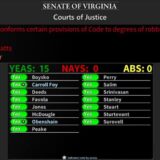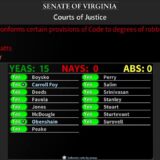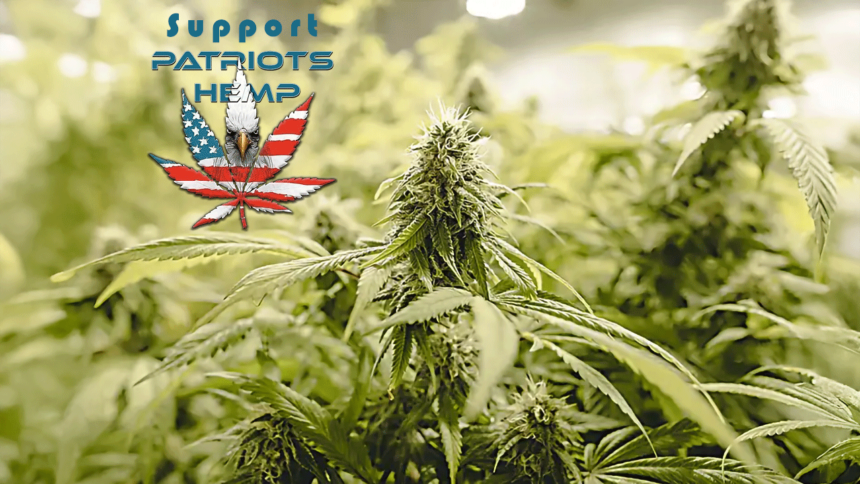A key House committee has amended a large-scale agriculture bill in a way that would impose a general ban on hemp-derived cannabinoids such as delta-8 THC—with some industry stakeholders saying it could even federally criminalize many CBD products because the measure’s scope covers all ingestible hemp products with any level of THC.
If enacted into law, cannabinoids that are “synthesized or manufactured outside of the plant” would no longer meet the definition of legal hemp.
At the same time, the legislation that is set to advance through the House Agriculture Committee on Thursday also contains provisions that would reduce regulatory barriers for certain hemp farmers and scale-back a ban on industry participation by people with prior drug felony convictions.
Members adopted the cannabinoid ban amendment from Rep. Mary Miller (R-IL) as part of an en bloc package with other unrelated changes in voice vote. The overarching bill is expected to clear the committee later in the day before moving to the floor.
The move comes following a push from prohibitionists and certain marijuana companies who argued in favor of restricting the cannabinoid products, describing it as a fix to a “loophole” that was created under the 2018 Farm Bill that federally legalized hemp.
The ban’s adoption by the panel likely sets the stage for a showdown with the Democratic-controlled Senate, which has yet to release the full text of its version of the Farm Bill.
“My amendment will close the loophole created in the 2018 Farm Bill that allows intoxicating hemp products like delta-8 to be sold,” Miller said ahead of the vote. “These products are being marketed to children and sending hundreds of them to the hospital. We must stop teenagers and young children from being exposed to addictive and harmful drugs.”
Today, I am offering an amendment to close the loophole Congress created that allows the sale of intoxicating “Delta-8” THC products, which are being marketed to kids and teenagers. Parents strongly oppose these drug-infused products being pushed on children as candy or snacks. pic.twitter.com/4xox6RBc5T
— Mary Miller (@Miller_Congress) May 23, 2024
Rep. John Rose (R-TN) said the amendment “contains the clarification needed to decipher accurately the intentional and unintentional products currently developed under the 2018 definition of hemp.”
“Hemp is a product that requires and demands the correct guidelines, and if we do not provide these guidelines, we are threatening the safety of Americans,” he said.
A Democratic member, Rep. Abigail Spanberger (D-VA), said her support for the amendment is “related specifically to the benefit that it would have for Virginia farmers as they are trying to understand this ever-changing landscape.”
“Greater clarity is incredibly important, and particularly for fiber hemp producers, this amendment would make clear the valuable work that they do and make clear the viability of their product,” she said.
Several Republican members of the committee, however, made comments in opposition to the amendment.
“American farmers around the country have invested their time and resources over the last six years to develop a domestic supply chain of hemp and hemp products,” Rep. Jim Baird (R-IN) said. “Hemp provides a great opportunity for family farm to diversify their farm income by using him as a rotational crop.”
“American farmers deserve the certainty afforded with the current definition of hemp,” he said. “The proposed amendment arbitrarily changes the current congressionally written definition of hemp.”
Rep. Derrick Van Orden (R-WI) voiced opposition to the amendment, too. He said the “issue is this Congress inadvertently created this problem in the 2018 Farm Bill because they could not reasonably predict, or they they didn’t reasonably predict, that these types of cannabinoids could be synthesized and then they passed this bill through in the intervening time.”
“There are now tens of thousands of Americans who have created different businesses, including several in my district now, that are using this process to feed their own kids,” he said.
Rep. Zach Nunn (R-IA) said that, “as a dad of six, I certainly share my colleagues passion for protecting children from accessing dangerous drugs, but this amendment goes too far by eliminating grain and fiber markets and instead protecting children through appropriate regulation to drive down the illicit marketplace.”
Paradoxically, select marijuana businesses have found themselves on the same side as prohibitionists in pushing such a ban. In a letter to congressional leaders last month, the U.S. Cannabis Council (USCC) proposed specific language they wanted to see included that would place hemp-derived cannabinoids containing any amount of THC under the definition of federally illegal marijuana.
While they’ve focused on the need to address public safety concerns related to unregulated “intoxicating” cannabinoid products such as delta-8 THC, some hemp industry advocates say the effect of the proposed language could be a ban on virtually all non-intoxicating CBD products as well, as most on the market contain at least trace levels of THC, consistent with the Farm Bill definition of hemp that allows for up to 0.3 percent THC by dry weight.
“The 2018 Farm Bill has wrongly been used to justify the mass production and sale of unregulated intoxicating hemp products,” USCC Executive Director Ed Conklin said in a press release following the amendment vote. “We support a uniform approach to regulating intoxicating THC products. That means intoxicating hemp products should be regulated the same as cannabis products. We believe that all of these products should be available for sale to adults with strict age gating and safety standards.”
“Rep. Mary Miller’s amendment would firmly close the so-called Farm Bill loophole by further clarifying the definition of hemp to strictly cover naturally-occurring, non-intoxicating products,” he said. “Today’s adoption of the amendment is a strong signal that Congress is serious about addressing the national crisis posed by unregulated intoxicating hemp products.”
Hemp industry stakeholders have recognized that there’s a need to address legitimate concerns related to the unregulated market that’s proliferated since hemp was federally legalized, but the solution they’ve put forward is to enact strategic regulations to ensure product safety and prevent youth access.
Jonathan Miller, general counsel at the U.S. Hemp Roundtable, alerted supporters to the amendment’s introduction on Thursday, saying the group’s members “strongly oppose” the legislation and urged lawmakers to defeat it.
“While we have for years strongly supported efforts to regulate hemp and CBD–even testifying to that effect before Congress–the Mary Miller Amendment throws the baby out with the bathwater, devastating a vibrant industry, killing tens of thousands of agriculture and retail jobs, and denying access to popular products that Americans count on for their health and wellness,” he said.
Hemp-Killing Amendment in Farm Bill would ban ALL ingestible hemp with any THC, destroying 95% of the market, including CBD. Vote is TOMORROW!!
Send an urgent message to your Rep. ASAP using this link asking for a no vote!https://t.co/a5lMTERZKK pic.twitter.com/4ActyIo7Hl
— US Hemp Roundtable (@HempRoundtable) May 23, 2024
“If the hemp industry is being attacked by MSOs and [Smart Approaches to Marijuana] at the same time, we must be doing something right,” Jim Higdon, co-founder of the Kentucky-based CBD company Cornbread Hemp, told Marijuana Moment on Thursday.
“Our opponents are a Baptist-bootlegger coalition made up of multi-state cannabis operators, prohibitionist organizations, and MAGA extremists,” he said. They are angry that THC has become too legal in America through the 2018 Farm Bill. We will never fully legalize cannabis in America if MSO’s continue to believe that hemp is their enemy.”
“The hemp industry is currently doing the hard work to become federally regulated. FDA is refusing to issue those regulations,” he said. “And now cannabis MSO’s are attacking hemp companies for being unregulated, which makes them either dishonest or ignorant. Perhaps both.”
Outside of the cannabinoid ban, the bill as drafted would build upon the federal legalization of the crop under the 2018 version of the legislation in several meaningful ways, including by revising the definition of hemp to create separate categories for producers who grow the crop for cannabinoid extraction for human and animal consumption and for “industrial hemp” producers who cultivate it for fiber, grain, oil and seed not intended for consumption.
Under the legislation, those who are licensed as “industrial hemp” producers could see reduced regulatory restrictions, with the U.S. Department of Agriculture (USDA), states and Indian tribes empowered to authorize visual inspections and “performance-based sampling methodologies” for compliance purposes.
Farmers growing hemp to extract cannabinoids for human or animal consumption, however, would continue to be subject to more intensive inspections and laboratory testing as prescribed under the 2018 Farm Bill.
The revised inspection and testing provisions were “inspired” by a bipartisan bill titled the “Industrial Hemp Act” that was introduced last year by Reps. Matt Rosendale (R-MT) and Chrissy Houlahan (D-PA), a section-by-section summary said.
Also, the legislation would allow USDA to independently accredit laboratories to conduct the sample testing. That would help resolve bottlenecking issues that’s beleaguered the industry, as the current law requires farmers to have their products tested only by a limited number of Drug Enforcement Administration- (DEA) certified labs.
Another proposed change to federal hemp statute would make it so USDA, states and tribal entities could choose to eliminate a policy that prevents people with felony drug convictions in the past 10 years from being licensed to produce industrial hemp.
However, advocates had hoped to see more expansive language, such as what was described in Senate Democrats’ recent summary of their forthcoming Farm Bill draft. Under that plan, there would be a mandate to eliminate the ban, rather than simply authorizing it, and it would cover all hemp producers, not just those growing it for non-extraction purposes.
That said, the Senate Agriculture Committee has not yet released the draft text of their bill, so it remains to be seen if the summary description matches what will ultimately be released. Bipartisan House lawmakers filed standalone legislation last year that would broadly lift the felony ban for would-be hemp producers.
The House Agriculture Committee bill also includes a provision that says businesses that “knowingly” misidentify themselves as “industrial hemp” producers potentially subjected to reduced restrictions “shall be ineligible to participate in the program established under this section for a period of 5 years beginning on the date of the violation.”
Another component of the legislation would prevent state agencies from denying public assistance benefits to people simply because they have a felony drug conviction or because they’ve failed to “satisfy an action required under a Federal, State, or local law relating to a means-tested public assistance program that was required as a result of a felony drug conviction.”
Meanwhile, state marijuana regulators have proposed updating the agriculture legislation with provisions clarifying states’ rights to enact their own regulations for hemp-based intoxicating cannabinoids, citing instances where there’s been litigation asserting that federal law preempts such rulemaking.
“Federal clarification of states’ existing authority is thus essential to allow states to continue to protect public health and integrity in the hemp industry—as the 2018 Farm Bill always intended,” three executives with the Cannabis Regulators Association (CANNRA) said in a recent letter to congressional leaders.
CANNRA had previously recommended to Congress in a letter last year that lawmakers adjust the federal definition of hemp and modify rules around hemp-derived cannabinoids.
Lawmakers and stakeholders have also been eyeing a number of other proposals that could be incorporated into the Farm Bill—and which could come up as proposed amendments as the proposal moves through the legislative process—including measures to free up hemp businesses to legally market products like CBD as dietary supplements or in the food supply.
—
Marijuana Moment is tracking more than 1,500 cannabis, psychedelics and drug policy bills in state legislatures and Congress this year. Patreon supporters pledging at least $25/month get access to our interactive maps, charts and hearing calendar so they don’t miss any developments.![]()
Learn more about our marijuana bill tracker and become a supporter on Patreon to get access.
—
Meanwhile, the hemp market started to rebound in 2023 after suffering significant losses the prior year, the latest annual industry report from the U.S. Department of Agriculture (USDA) that was released last month found.
The data is the result of a survey that USDA mailed to thousands of hemp farmers across the U.S. in January. The first version of the department’s hemp report was released in early 2022, setting a “benchmark” to compare to as the industry matures.
Bipartisan lawmakers and industry stakeholders have sharply criticized FDA for declining to enact regulations for hemp-derived CBD, which they say is largely responsible for the economic stagnation.
To that end, FDA Commissioner Robert Califf testified before the House Oversight and Accountability Committee last month, where he faced questions about the agency’s position that it needed additional congressional authorization to regulate the non-intoxicating cannabinoid.
USDA is also reportedly revoking hemp licenses for farmers who are simultaneously growing marijuana under state-approved programs, underscoring yet another policy conflict stemming from the ongoing federal prohibition of some forms of the cannabis plant.
For the time being, the hemp industry continues to face unique regulatory hurdles that stakeholders blame for the crop’s value plummeting in the short years since its legalization. Despite the economic conditions, however, a recent report found that the hemp market in 2022 was larger than all state marijuana markets, and it roughly equaled sales for craft beer nationally.
Meanwhile, internally at USDA, food safety workers are being encouraged to exercise caution and avoid cannabis products, including federally legal CBD, as the agency observes an “uptick” in positive THC tests amid “confusion” as more states enact legalization.
Photo courtesy of Brendan Cleak.





















